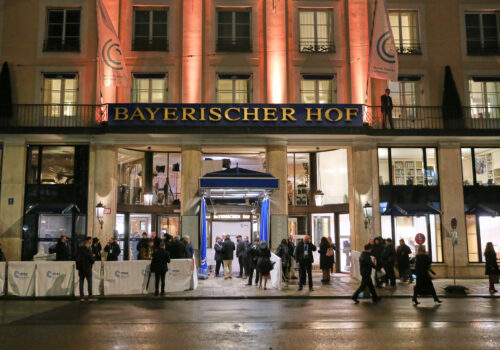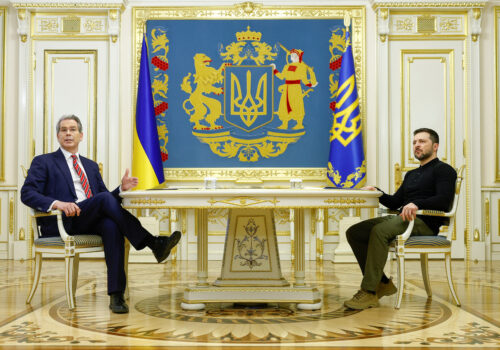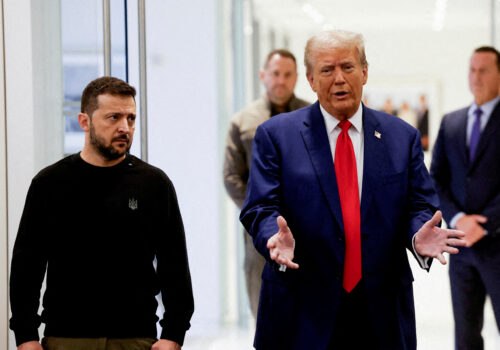What Munich means for Ukraine peace talks
GET UP TO SPEED
The table has been set. In the coming days, US and Russian negotiators reportedly will meet in Saudi Arabia to try and strike a deal to end Russia’s full-scale war against Ukraine. The news broke at the Munich Security Conference, where the war’s future dominated discourse among world leaders at the annual gathering. To understand the significance of what was said on the Munich stages, behind closed doors, and in the corridors between, we turned to Atlantic Council experts who were on site at the Hotel Bayerischer Hof.
TODAY’S EXPERT REACTION BROUGHT TO YOU BY
- John E. Herbst (@JohnEdHerbst): Senior director of the Atlantic Council’s Eurasia Center and former US ambassador to Ukraine
- Anna Wieslander (@AnnwieAnna): Director for Northern Europe at the Atlantic Council and former official at the Swedish Defence Ministry and Swedish Parliament
- Jörn Fleck (@JornFleck): Senior director of the Atlantic Council’s Europe Center and former European Parliament staffer
Mixed messages
- In the whirlwind of US President Donald Trump’s first month, “no week has featured more intensive activity to negotiate an end to Moscow’s war of aggression against Ukraine than this past one,” John tells us.
- But Trump and his top lieutenants, including Vice President JD Vance and Defense Secretary Pete Hegseth, have sent conflicting messages regarding how tough they plan to be on Russian President Vladimir Putin. John notes that in recent days Trump said that Ukraine “may be Russian some day,” but the president also stated that the United States will continue to provide aid to Ukraine because otherwise “Putin would say he had won.”
- The week’s most significant development, John argues, may have been US Treasury Secretary Scott Bessent’s meeting with Ukrainian President Volodymyr Zelenskyy, where they discussed the possibility of a deal to provide the United States with rare-earth and critical minerals in exchange for US weapons. Although the parties did not reach an agreement, “it is significant that the transactional Trump sees a concrete business and security prize for engaging Ukraine and ensuring its long-term survival and sovereignty,” John observes.
Sign up to receive rapid insight in your inbox from Atlantic Council experts on global events as they unfold.
Peace playbook
- Heading into the negotiations in Saudi Arabia, John believes the contours of Trump’s peace plan, which still has not been officially released, remain largely unchanged, despite the mixed signals. The proposal includes two major concessions for Ukraine: the loss of some of the territory that Russia has seized since 2014 and at least a twenty-year moratorium on joining NATO. And it includes two major concessions for Russia: the heavy arming of Ukraine and the establishment of a demilitarized zone between Ukrainian and Russian forces, occupied by European troops.
- “If this policy is rigorously implemented, it could produce a durable peace,” John maintains.
Europe out in the cold
- But the prospect of US-Russian negotiations on resolving the war—without the involvement of Ukrainian or European officials—sounded alarms in Munich. Anna tells us that “European leaders reacted fiercely against the American proposition that Europe should provide security guarantees [to Ukraine] without the involvement of the United States,” including the idea that European troops should be on the ground in Ukraine without US backup. “Such an arrangement would create a dangerous split within NATO and go against the spirit of the Alliance.”
- Indeed, there was much discussion of the US posture as a “wake-up call” for the continent, Jörn says, but there was “little evidence that Europe managed more than a few hits of the snooze button and decade-old statements about their determination to really wake up and step up—on their own security and support for Ukraine.” European leaders demanded a seat at the negotiating table for themselves and Ukraine, but “without much apparent leverage to find a hearing in Washington,” Jörn adds.
- Jörn shares that “it took Zelenskyy, not one of Europe’s traditional leaders, to give the most clear-eyed assessment of what Europe is facing and what strategies might save it from Russian aggression, American indifference, and geopolitical irrelevance.” Jörn notes Zelenskyy’s call for integrated European armed forces and his declaration that “the old days are over” when it comes to US backing of Europe, while maintaining that negotiations should be held to the standard of “no decisions about Europe without Europe.”
- “To some, parts of the speech may sound as if advocates of strategic autonomy in Paris drafted it,” Jörn said. And sure enough, French President Emmanuel Macron, who has expressed support for deploying European troops to Ukraine, called an emergency European leaders summit on Ukraine for Monday.
- As negotiations approach, Anna says the Trump team will need “to listen and adjust, and to recognize that peace between Russia and Ukraine cannot be sustainable without the acceptance of all parties, including Europe.”
Further reading
Fri, Feb 14, 2025
Dispatch from Munich: Trump has put European history in motion again
Inflection Points By Frederick Kempe
As the annual Munich Security Conference opens, there is a palpable sense that the city might again be a place where history is made.
Thu, Feb 13, 2025
Europe needs a seat at the table in Ukraine negotiations
New Atlanticist By Jörn Fleck, James Batchik
European leaders must quickly make the case to the Trump administration for collaboration in negotiations—and show their willingness to step up.
Wed, Feb 12, 2025
What to make of the unfolding Trump strategy on Ukraine
New Atlanticist By Daniel Fried
Trump's call with Putin and his secretary of defense's comments with NATO counterparts stirred controversy. But the unfolding strategy could be the basis for a decent outcome for Ukraine.
Image: Standing ovation before speech of VOLODYMYR ZELENSKYY, President of Ukraine at talk Defiance and Diplomacy: Prospects for Ukraines Future at the 61st Munich Security Conference MSC at the Hotel Bayerischer Hof. Munich Bavaria GermanyNo Use Switzerland. No Use Germany. No Use Japan. No Use Austria


